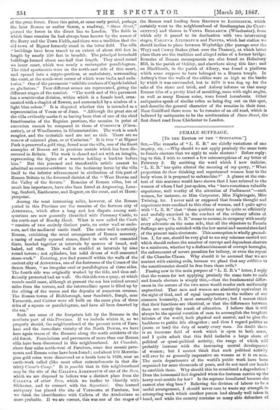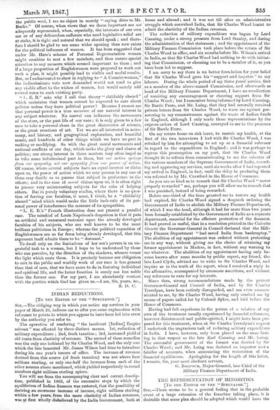FEMALE SUFFRAGE.
[To THE EDITOR OF THE " SPECTATOR:] SIR,—The remarks of "L. E. B." are chiefly variations of one inquiry, viz. : —Why should we not apply precisely the same teats to female electors that we apply to male electors ? Before reply- ing to this, I wish to correct a few misconceptions of my letter of February 2. By omitting the word which I now italicize, "L. E. B." has quite altered the meming of my query, " What proportion do these thinking and experienced women bear to the body whom it is proposed to enfranchise ?" A glance at the con- text of this sentence would have shown that I here referred to the women of whom I had just spoken, who "have sometimes valuable experience, well worthy of the attention of Parliament "—such women, for instance, as Miss Carpenter, Miss Nightingale, Miss Twining, &c. I never said or supposed that female thought and experience were confined to this class of women, and I quite agree with "L. E. B." that "these qualities may be quite as efficiently and usefully exercised in the conduct of the ordinary affairs of life." Again," L. E. B." seems to assume, in company with nearly every advocate on the same side, that all the objectors to Female Suffrage are quite satisfied with the low moral and mental standard of the present male electorate. This assumption is wholly ground- less. I, for one, should be very glad to see any schemes carried out which should reduce the number of corrupt and dependent electors to a minimum, whether by a disfranchisement of corrupt boroughs, the enforcement of severe penalties for bribery, or oven the repeal of the Chandos Clause. Why should it be assumed that we are content with existing evils, because we plead that any addition to the constituencies should be free from those evils?
Passing now to the main purpose of "L. E. B.'s " letter, I reply that the reason for not applying precisely the same tests to male and female electors is simply this,—that the fundamental differ- ences in the nature of the two sexes would render such uniformity unpractical. That men and women are absolutely equivalent in the sight of God, and of equal importance to the welfare of our common humanity, I most earnestly believe ; but I cannot think that their functions are identical, or that the differences between them are merely the result of education. I believe that it will always be the special vocation of men to accomplish the toughest labours of the world, both physical and mental, and to give the backbone to public life altogether ; and thus I regard politics as (more or less) the duty of nearly every man. No doubt there is an immense field of work which is open to both sexes, and I quite admit that this field includes a large share of political or quasi-political activity, the range of which will probably increase with the increasing mental development of women ; but I cannot think that such political activity will ever be as generally imperative on women as it is on men. The main departments of the world's public work have been organized for some thousands of years, and do not need our hands to establish them. Why should this be considered a degradation? Does the housemaid feel degraded when the footman carries up the heavy coal-scuttle for her? Is the soprano humiliated because she cannot also sing bass ? Believing the division of labour to be a useful arrangement, I should never care to waste my strength in attempting work which another person had already well taken in hand, and while the country contains so many able defenders of nomy, and history, and geographical exploration, and beautiful On my return home on sick leave, to recruit my health, at the music, and hundreds of other things which we have no part in first of the two interviews I had with Sir Charles 1Vood, I was making or modifying. So with the great moral movements and rebuked by him for attempting to set up as a financial reformer national conflicts of our day, which make the glory and charm of in regard to the expenditure in England ; and it was perhaps to polities; our strong interest in these matters may often impel us repress this presumption on my part, that Sir Charles Wood to take some infinitesimal part in them, but our action springs thought fit to refrain from communicating to me the minutes of from our sympathy, not our sympathy from our power of action, the various members of the Supreme Government of Tuella, record- Of course, where several subjects have an equal interest or claim ing and approving my services, until six weeks after I had reported upon us, the power of action which we may possess in any one of my arrival in England, in fact, until the delay in producing them them may decide us to pursue that subject in preference to the was referred to by Mr. Crawford in the House of Commons.
others ; and in the case of moral claims upon us, it is often right As you are so kind as to remark that Sir Charles Wood "never to pursue very uninteresting subjects for the sake of helping properly rewarded" me, perhaps you will allow me to remark that others. But in purely voluntary studies, where there is no ques- I was punished, instead of being rewarded.
tion of forcing our faculties, it must, I think, be a "childishly Before one-third of the time granted me to restore my health absurd" mind which would make the little inch-rule of its per- had expired, Sir Charles Wood signed a despatch ordering the
sonal power of interference the measure of its sympathies. Government of India to abolish the Military Finance Department,
"L. E. B.'s" French illustration does not present a parallel of which I was the head, although it had for more than two years case. The mischief of Louis Napoleon's despotism is that it puts been formally established by the Government of India as a separate an artificial and unnatural restraint upon the already developed department, essential for the efficient protection of the finances. faculties of his subjects, who are well known to be the most It had proved so useful, that in a resolution printed in the Calcutta brilliant politicians in Europe ; whereas the political capacities of Gazelle the Governor-General in Council declared that the Mill- Englishwomen are so far from being already developed, that this tary Finance Department "had saved India from bankruptcy."
argument itself admits them to be "dormant." The abolition of my appointment was ordered without protecting
To dwell only on the limitations of her sex's powers is an un- me in any way, without giving me the choice of retaining my grateful ta-sk to a woman, but I hope to be understood by those former appointment in Madras, in fact, without any warning to who can perceive, by the direction of the shadows, whence comes me whatever. The abolition of my appointment having only be- the light which casts them. It is precisely because our obligation come known after some months by public report, my friend, the to mix in the public and worldly work of our race is less general late Lord Clyde, advised me to write to Sir Charles Wood, and than that of men, that we have more to do in fostering individual inquire as to the truth of the report, when I received a reply in and spiritual life, and the latter function is surely not less noble the affirmative, accompanied by erroneous assertions, and without. than the former one. For my part, I am abundantly content any reference to care for my interests.
with the portion which God has given us.—I am, Sir, yours, &c., Since then, strong recommendations made by the present



































 Previous page
Previous page